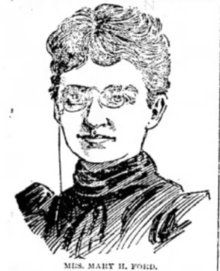Mary Hanford Ford (née Finney; November 1, 1856 – February 2, 1937) was an American lecturer, author, art and literature critic and a leader in the women's suffrage movement. She reached early notoriety in Kansas at the age of 28 and soon left for the Chicago World's Fair. She was taken up by the society ladies of the Chicago area who, impressed with her talks on art and literature at the Fair, helped launch her on a new career, initially in Chicago and then across some States. Along the way she was already published in articles and noticed in suffrage meetings.
In addition to work as an art critic and speaker she wrote a number of books, most prominently a trilogy Message of the Mystics. Circa 1900 to 1902 Ford found the Baháʼí Faith through Sarah Farmer and Mírzá Abu'l-Faḍl, and helped form the first community of Baháʼís in Boston where Louis Bourgeois, future architect of the first Baháʼí House of Worship in the West, then joined the religion. In 1907 Ford went on Baháʼí pilgrimage, in 1910 she started writing Baháʼí books such as The Oriental Rose, and traveled with ʻAbdu'l-Bahá during some of his journeys in various places in Europe and then America.
Ford was blamed for a fiasco among UK suffragists but it was their own violence that got them in trouble. Ford spent the years of World War I in California following the first Baháʼí International Congress at the Panama–Pacific International Exposition, and then moved back to New York where she spent almost the next 20 years. Often she traveled to Europe for some months of the year and during this period introduced the religion to Ugo Giachery, later a prominent Baháʼí. Also in this period she was censored off a radio broadcast, helped develop the religion's community both in meetings she supported and literary efforts, before reducing her travels and speaking engagements in the early 1930s. She died with her daughter by her bedside in 1937.
